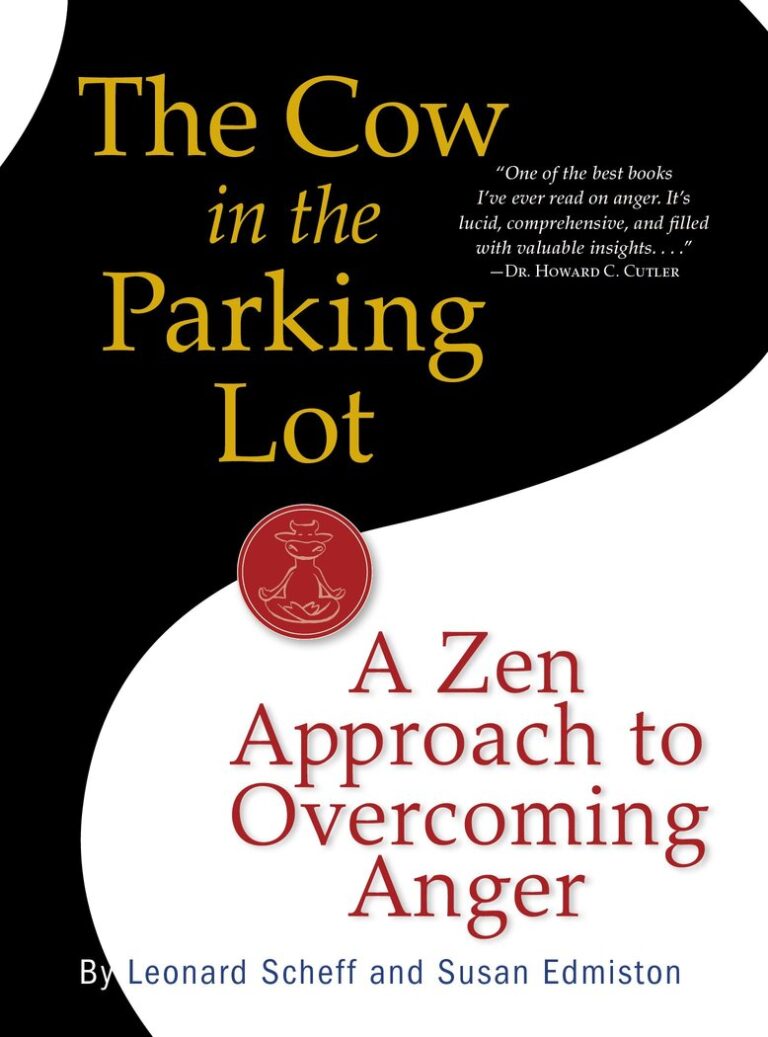Managing anger is like putting a mean dog on a leash: he can still bite you or other people. Transforming anger is making the dog into a friendly pet.
Based on the successful anger management program (Letting Go of Anger Seminar) Leonard Scheff created, The Cow in the Parking Lot shows how anger is based on unmet demands, and introduces the four most common types—Important and Reasonable (you want love from your partner); Reasonable but Unimportant (you didn’t get that seat in the restaurant window); Irrational (you want respect from a stranger); and the Impossible (you want someone to fix everything wrong in your life).
The Cow in the Parking Lot teaches how to harness the powerful but entirely negative energy of anger and change it into positive and compassionate emotions, giving you the strength to love others and live at peace with yourself.
“You are hitting your hand with a hammer. If you stop, you will feel better.”
The Cow in the Parking Lot is based upon the teachings of the Dalai Lama and other important Buddhist teachers from the Buddha to the present, the processes, tools and practical exercises.
The Cow in the Parking Lot teaches that anger arises from an unmet demand, and illuminates the sources of the four most common types of anger:
- Important and Reasonable: You want love from your partner
- Reasonable but Unimportant: You didn’t get that seat in the restaurant window
- Irrational: You want respect from a stranger
- Impossible: You want someone to fix everything wrong in your life
Once we identify our real unmet demands — we can dissolve anger and how, once we understand our “buttons,” we can change what happens when they’re pushed.
Transforming Anger Workshop
“The notion that you can do without anger may seem contrary to your conditioning, as it did to mine when I attended the teachings of the Dalai Lama, in Tuscon, Arizona, in 1993.”
“I found myself happier than I had ever been or thought I could be. Wanting to share my experience with others, I developed a three-hour workshop called “Transforming Anger,” in which I tried to make some of the Dalai Lama’s teachings accessible to those who had no acquaintance with Buddhism. I added some exercises and ideas from other disciplines that I thought would be helpful.”
“The only thing that changes is your reaction to the outcome. In other words, no one causes us to be angry. Anger is not inevitable. Anger begins and ends with ourselves”
Most of the time, when people act offensively, their behavior is not aimed at us. Even if there is no doubt the offender is talking to you, or interacting with you, what he says most likely has nothing to do with who you are or what you have done. It’s not personal; he doesn’t know you. You just happen to be a stage prop in an internal drama taking place in his mind.
“Anger is often an immediate but irrational reaction based on a notion we have in our heads. What we feel is based to a great degree on what we think.”
Anger working Hypothesis
Anger is a destructive emotion.
• The first person damaged by your anger is you.
• When you act out of anger, you will act irrationally.
• You can, if you choose, reduce the amount of anger in your life.
• As you reduce anger in your life, you will be happier and more effective.
The Cause of Anger: An unmet Demand
The cause of anger is simple: Anger arises when we have an unmet demand. We all make basic demands on the world around us. Some are ongoing, such as the one that others not injure us. Others arise only under special conditions, such as expecting a birthday present or to be left alone when we are working. We make particular demands in particular relationships, such as marriage or work.
The demand may be tangible—you expect to be paid for your work—or intangible—you want another person to respect you or love you. However, many of our demands, may be insignificant and serve only to perpetuate anger in our lives.
“Whether the event is trivial or significant, the cause of anger is always the same. Underlying the emotional tumult, there is a need that is not being met and that you expect to be met. ”
The Four types of Demands
“• The Important and Reasonable Demand
You want your partner to love you.
This type is entirely justifiable and significant.
• The Reasonable but Unimportant Demand
You want to be seated by the window at a restaurant; you want to eat Chinese, she wants to eat Italian. ”
“ The Irrational Demand
You don’t want to put up with traffic annoyances. You want respect from a stranger.
When you look at it, this demand is silly or unreasonable.
• The Impossible Demand
“I want people to accept my wisdom” or “I want everyone to love me.” “Make me happy” or “I want you to fix everything that’s wrong with my life.”
“Demands in this category are usually ongoing rather than occasioned by a single incident, and are expressed in terms of generalities. This type of expectation, because it can’t be met, provides the justification for ongoing anger and is the basis for a chronic renunciation of happiness.”
All the best in your quest to get better. Don’t Settle: Live with Passion

Comments are closed.